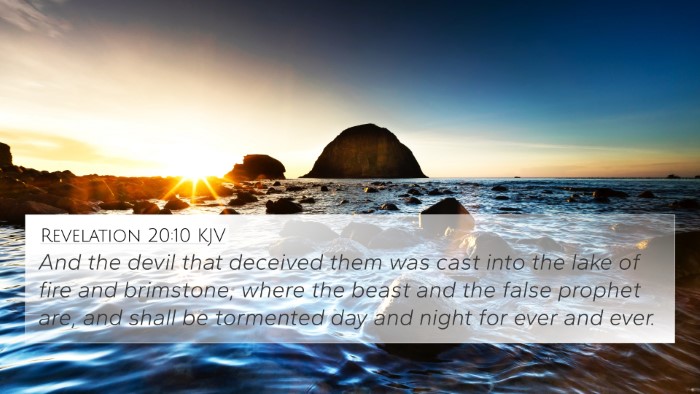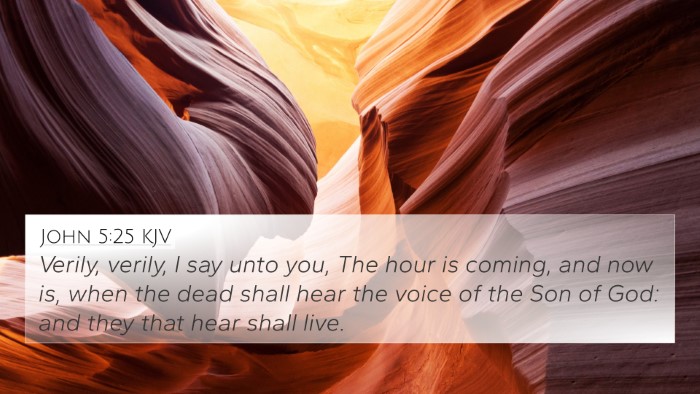Understanding Ephesians 1:21
Ephesians 1:21 states, "Far above all principality, and power, and might, and dominion, and every name that is named, not only in this world, but also in that which is to come:" This verse emphasizes the supreme authority of Jesus Christ over all spiritual and earthly powers. In order to grasp the full meaning of this scripture, we can combine insights from various public domain commentaries.
Contextual Analysis
To truly understand Ephesians 1:21, it’s crucial to consider its context. The Apostle Paul wrote this letter to the Ephesians to enlighten them about the greatness of God's plan for salvation and the supremacy of Christ. Ephesians chapters 1 to 3 particularly focus on theological themes concerning the church and its relationship to Christ.
Insights from Matthew Henry
According to Matthew Henry, this verse serves to highlight the exaltation of Christ following His resurrection and ascension. Henry points out that Christ is not only elevated above earthly rulers but also spiritual beings. This suggests that there are powers and authorities in the spiritual realm which recognize His authority.
Insights from Albert Barnes
In his analysis, Albert Barnes elaborates that "principality" refers to the highest orders of authority, both in heaven and on earth. Barnes emphasizes that the enumeration of powers signifies the completeness of Christ's dominion, reinforcing that He surpasses all forms of power in both the current age and the age to come.
Insights from Adam Clarke
Adam Clarke provides an extensive commentary emphasizing the "names" mentioned in this verse. He indicates that every title and dominion falls under Christ, stressing His ultimate sovereignty as the crowned King. The verse assures believers of Christ's eternal authority, foreshadowing the ultimate victory over every opposition.
Key Themes in Ephesians 1:21
- Christ's Supremacy: The verse reveals Christ's absolute supremacy over all entities, illustrating the theme of His kingship.
- Spiritual Warfare: Understanding the hierarchy of powers and principalities conveys the reality of spiritual warfare.
- Eschatological Implications: The reference to "that which is to come" hints at eschatological significance and the final victory of Christ.
- Reassurance for Believers: This proclamation serves to reassure the church of Christ's ongoing authority amidst their struggles.
Bible Cross-References
In studying Ephesians 1:21, several biblical verses serve as cross-references, illustrating the connections between scripture and enhancing our understanding:
- Colossians 1:16-17: This passage affirms the preeminence of Christ in creation and His role in sustaining all things.
- Philippians 2:9-11: Here, Paul states that God highly exalted Jesus and gave Him a name above all names, emphasizing His authority.
- Hebrews 1:3: This verse mentions Christ as the radiance of God’s glory and the exact representation of His being, reinforcing His divine nature.
- Romans 8:38-39: Paul reassures believers that nothing can separate them from the love of God, underlining Christ's power over all spiritual forces.
- Matthew 28:18: The Great Commission reveals Jesus claiming all authority in heaven and earth, accentuating His dominion.
- 1 Peter 3:22: Christ's ascension to heaven and authority over angels and authorities reaffirms His exalted position.
- Revelation 19:16: In this verse, Jesus is proclaimed as "King of Kings and Lord of Lords," marking His ultimate reign.
Connections Between Bible Verses
The thematic connections between Ephesians 1:21 and the aforementioned cross-references signify a broader biblical narrative concerning Christ's authority. This indicates an ongoing inter-Biblical dialogue regarding Jesus’ sovereignty:
- Examining Colossians 1:16-17 alongside Ephesians highlights how Christ's authority extends over both visible and invisible realms.
- The connection with Philippians 2:9-11 serves to equip believers with the understanding of worship directed towards Christ.
- An analysis connecting Matthew 28:18 to Ephesians reinforces the concept of Christ sending His followers out under His authority.
Tools for Bible Cross-Referencing
Utilizing tools for Bible cross-referencing can enhance your study and understanding of verses like Ephesians 1:21:
- Bible Concordance: Use a concordance to find specific terms and their occurrences in scripture.
- Cross-Reference Bible Study: Engage with cross-references to link related verses for deeper analysis.
- Bible Chain References: Follow a sequence of verses linked by similar themes or ideas.
Conclusion
In summary, Ephesians 1:21 magnificently reflects Christ's exalted position. By exploring this verse alongside insights from commentaries and relevant cross-references, we embody a comprehensive understanding of His divine authority. Such study tools empower believers to identify connections within Scripture, enriching their faith journey and offering strength against any spiritual challenges.





















